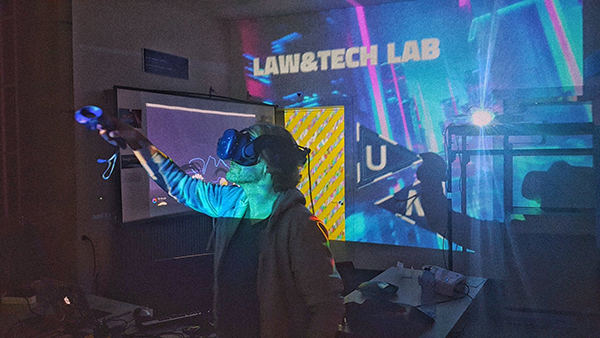 |
| Legal Network Analysis Workshop Series |
We are happy to announce the next Legal Network Analysis workshop. It will take place online on 10 May 2023 from 14:00h until 15:30h CEST. Two presenters will present and discuss the use of centrality measures. The presentations are followed by a Q&A.
You can sign up by clicking on the link below. Upon registration, you will be sent a Zoom link. |
|
|
|
|
| Professor Wolfgang Alschner |
 Professor Wolfgang Alschner is an empirical legal scholar specialized in international economic law and the computational analysis of law. He holds the Hyman Soloway Chair in Business and Trade Law. He is also an Associate Professor at the Common Law Section with cross-appointment to the Faculty of Engineering, School of Electrical Engineering and Computer Science. He is a faculty member of the Centre for Law, Technology and Society at the University of Ottawa and heads the uOttawa Legal Technology Lab. His research focuses on using social and computer science methods in order to empirically investigate international law. He worked on corpus analytics, text as data approaches, and machine learning techniques, enabling researchers to use analytical methods that cannot be applied to hand-coded data. He co-authored the study Text of Trade Agreements (ToTA) in which this approach is developed and applied. He furthermore created the educational resource Data Science for Lawyers to help lawyers master the skills of computer and data scientists. It pays attention to information extraction, predictive coding, and legal network analysis. Professor Wolfgang Alschner is an empirical legal scholar specialized in international economic law and the computational analysis of law. He holds the Hyman Soloway Chair in Business and Trade Law. He is also an Associate Professor at the Common Law Section with cross-appointment to the Faculty of Engineering, School of Electrical Engineering and Computer Science. He is a faculty member of the Centre for Law, Technology and Society at the University of Ottawa and heads the uOttawa Legal Technology Lab. His research focuses on using social and computer science methods in order to empirically investigate international law. He worked on corpus analytics, text as data approaches, and machine learning techniques, enabling researchers to use analytical methods that cannot be applied to hand-coded data. He co-authored the study Text of Trade Agreements (ToTA) in which this approach is developed and applied. He furthermore created the educational resource Data Science for Lawyers to help lawyers master the skills of computer and data scientists. It pays attention to information extraction, predictive coding, and legal network analysis. |
|
|
|
|
| Professor Ryan Whalen |
 Ryan Whalen is associate professor at the Faculty of Law, University of Hong Kong. Ryan Whalen’s research takes a data-driven approach to understanding the law and legal systems, with a particular focus on intellectual property law and innovation policy. This approach unites traditional doctrinal analyses with empirical techniques drawn from diverse fields including machine learning, natural language processing, legal network analysis, and data science. His work has appeared in a wide variety of journals including the University of Chicago Law Review, Research Policy, Science & Public Policy, the Northwestern University Law Review, the Yale Law Journal Forum, the Michigan State Law Review, and the Journal of the Patent and Trademark Office Society. He recently co-authored a study that takes a text analytic approach to measure and determine expertise diversity. He furthermore authored the edited volume Computational Legal Studies: The Promise and Challenge of Data-Driven Research. The book explores how computational data creation, collection, and analysis techniques are transforming the way in which we comprehend and study the law, and the implications that this has for the future of legal studies. Ryan Whalen is associate professor at the Faculty of Law, University of Hong Kong. Ryan Whalen’s research takes a data-driven approach to understanding the law and legal systems, with a particular focus on intellectual property law and innovation policy. This approach unites traditional doctrinal analyses with empirical techniques drawn from diverse fields including machine learning, natural language processing, legal network analysis, and data science. His work has appeared in a wide variety of journals including the University of Chicago Law Review, Research Policy, Science & Public Policy, the Northwestern University Law Review, the Yale Law Journal Forum, the Michigan State Law Review, and the Journal of the Patent and Trademark Office Society. He recently co-authored a study that takes a text analytic approach to measure and determine expertise diversity. He furthermore authored the edited volume Computational Legal Studies: The Promise and Challenge of Data-Driven Research. The book explores how computational data creation, collection, and analysis techniques are transforming the way in which we comprehend and study the law, and the implications that this has for the future of legal studies. |
|
|
|
|
| About this newsletter |
| This newsletter is provided to you by the Maastricht Law and Tech Lab. It is used to periodically update you about events and to share resources. Click here to share your input. |
|
|
|
|
|